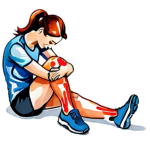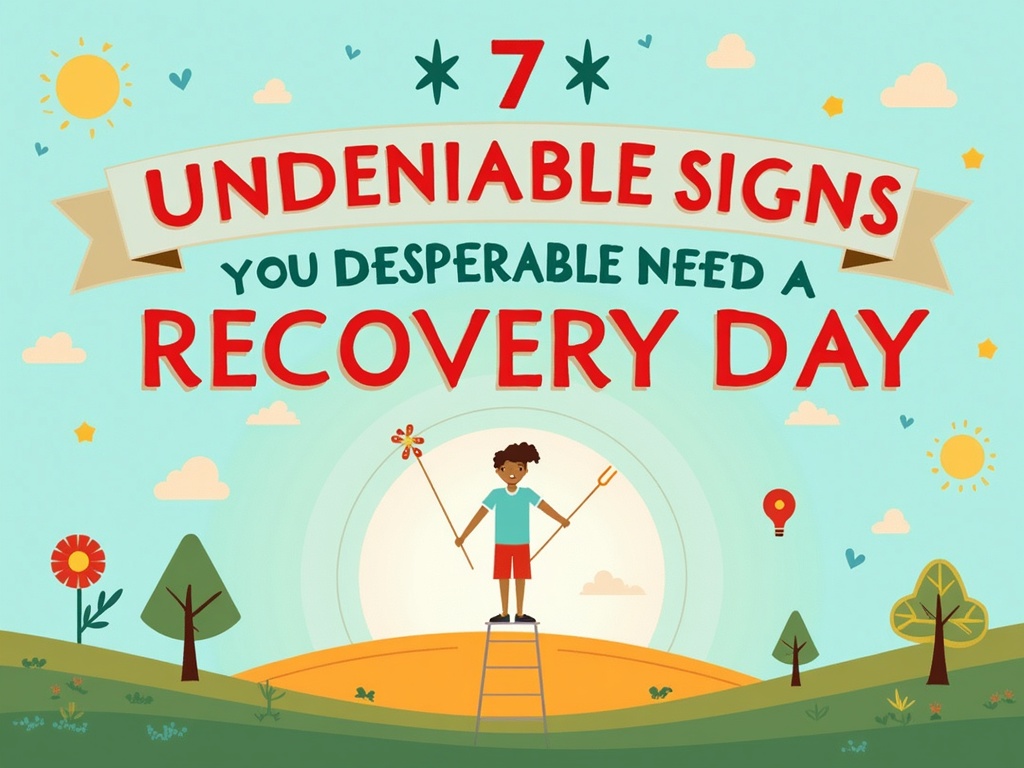7 Undeniable Signs You Desperately Need a Recovery Day
Picture this: you're staring blankly at your gym shoes, the mere thought of another workout sending shivers down your spine. Your muscles ache with a dull, persistent throb, and the energy you usually have is nowhere to be found. You’re pushing hard, committed to your goals, but is it possible you’re pushing *toohard? Recognizing when your body is screaming for a break is crucial, not just for preventing injury, but for optimizing your progress and overall well-being. This article will explore the key signs indicating you're overdue for a recovery day, helping you listen to your body and prioritize rest.
1. Relentless Muscle Soreness That Just Won't Quit
Delayed Onset Muscle Soreness (DOMS) is a familiar foe for anyone engaging in regular physical activity. That stiffness and tenderness you feel a day or two after a challenging workout is usually a sign your muscles are repairing and rebuilding. However, when that soreness lingers for days, becomes excessively painful, or even interferes with your daily activities, it's a major red flag.
Chronic muscle soreness is a clear indication that your muscles haven't fully recovered from the previous stress. Ignoring this persistent discomfort can lead to overtraining, increasing your risk of injury and hindering your overall performance. A recovery day allows those damaged muscle fibers to repair properly, reducing inflammation and paving the way for stronger, more resilient tissues.
2. Performance Plateaus or Declines
Are your workouts feeling harder than usual? Are you struggling to lift the same weights, run at the same pace, or complete the same number of repetitions? A dip in performance, despite consistent effort, can be a frustrating sign of inadequate recovery.
When your body is constantly under stress without sufficient rest, it can't adapt and improve. Instead, you might experience a plateau where your progress stalls, or even a decline in your strength, endurance, and power. A recovery day allows your nervous system and musculoskeletal system to recuperate, enabling you to come back stronger and more efficient.
3. Constant Fatigue and Low Energy Levels
We all feel tired sometimes, but persistent fatigue that goes beyond a normal day's wear and tear can be a major indicator that you need a recovery day. This isn't just a feeling of sleepiness; it's a deep-seated exhaustion that saps your motivation and makes even simple tasks feel like monumental efforts.
Overtraining and insufficient recovery deplete your energy stores, leaving you feeling drained and sluggish. Ignoring this fatigue can lead to chronic exhaustion, impacting your mood, cognitive function, and overall health. A recovery day allows your body to replenish its energy reserves, restoring your vitality and improving your mental clarity.
4. Increased Irritability and Mood Swings
Believe it or not, your physical exertion can significantly impact your emotional state. When you're constantly pushing your body to its limits without adequate rest, it can throw your hormones out of whack and disrupt your neurochemistry, leading to increased irritability, mood swings, and even feelings of anxiety or depression.
Stress hormones like cortisol are elevated during intense physical activity. Without sufficient recovery, these hormones can remain elevated, contributing to mood disturbances and making you more prone to emotional outbursts. A recovery day helps to regulate your hormones, promoting a sense of calm and emotional balance.
5. Sleep Disturbances and Insomnia
Sleep is the cornerstone of recovery. It's during sleep that your body repairs tissues, replenishes energy stores, and consolidates memories. However, when you're overtraining or not recovering adequately, your sleep patterns can be severely disrupted. You might find yourself tossing and turning at night, struggling to fall asleep, or waking up frequently.
The overproduction of stress hormones can interfere with your sleep-wake cycle, leading to insomnia and poor sleep quality. This lack of restorative sleep further exacerbates fatigue, muscle soreness, and mood disturbances, creating a vicious cycle. A recovery day allows your body to relax and unwind, promoting restful and rejuvenating sleep.
6. Frequent Illnesses and Weakened Immune System
Intense physical activity can temporarily suppress your immune system, making you more susceptible to infections and illnesses. When you're not recovering adequately, this suppression can become chronic, weakening your body's defenses and making you more likely to catch a cold, flu, or other infections.
Overtraining and lack of rest deplete your immune cells, reducing your ability to fight off pathogens. This can lead to frequent illnesses, forcing you to take even more time off from your training. A recovery day allows your immune system to rebound, strengthening your body's ability to ward off infections and keep you healthy.
7. Loss of Motivation and Enthusiasm
Remember that initial excitement you felt when you started your fitness journey? If that spark has dwindled and your workouts feel like a chore, it could be a sign you're pushing yourself too hard. Loss of motivation and enthusiasm are common symptoms of overtraining and burnout.
When your body and mind are constantly under stress, it can become difficult to maintain your passion for exercise. You might find yourself dreading your workouts, skipping sessions, or simply going through the motions without any real enjoyment. A recovery day allows you to recharge your batteries, both physically and mentally, reigniting your motivation and helping you rediscover the joy of movement.
What Does an Effective Recovery Day Look Like?
A recovery day doesn't necessarily mean lying on the couch all day (although that can be part of it!). It's about actively promoting recovery through various strategies that reduce stress and support your body's natural healing processes. Here are some ideas:
- Active Recovery: Engage in low-intensity activities like walking, swimming, yoga, or light cycling. These activities promote blood flow, reduce muscle stiffness, and help to flush out metabolic waste products.
- Rest and Relaxation: Prioritize sleep, aim for at least 7-9 hours of quality sleep per night. Practice relaxation techniques such as meditation, deep breathing exercises, or spending time in nature.
- Nutrition and Hydration: Focus on consuming nutrient-rich foods that support muscle repair and recovery, such as protein, complex carbohydrates, and healthy fats. Stay well-hydrated by drinking plenty of water throughout the day.
- Massage and Stretching: Consider getting a massage to relieve muscle tension and improve circulation. Incorporate gentle stretching exercises to increase flexibility and range of motion.
- Foam Rolling: Use a foam roller to self-massage your muscles, targeting areas of tightness and soreness. This can help to break up adhesions, improve blood flow, and reduce pain.
The Importance of Listening to Your Body
Ultimately, the key to knowing when you need a recovery day is to listen to your body. Pay attention to the signals it's sending you, and don't ignore the warning signs of overtraining and fatigue. By prioritizing rest and recovery, you'll be able to optimize your performance, prevent injuries, and achieve your fitness goals in a sustainable and enjoyable way. Remember, recovery is not a luxury; it's an essential component of any successful training program. So, give yourself permission to take a break, recharge, and come back stronger than ever!


